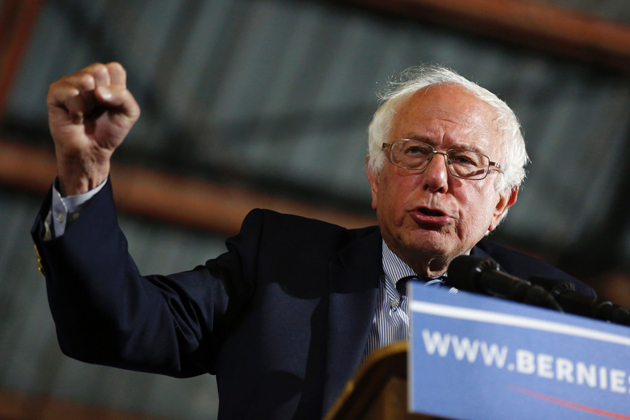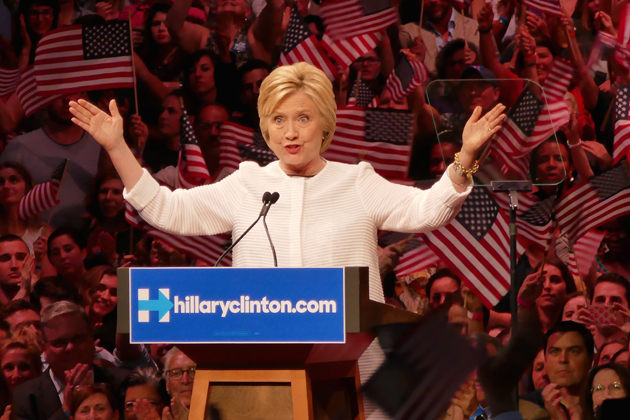Faced with the specter of a Trump presidency, calls for Democrats to "unify the party" are reaching a crescendo. Now that Hillary Clinton has won a clear majority of pledged delegates as well as 55 percent of the popular vote and been declared the presumptive nominee, calls for Bernie Sanders to drop out of the race have an undeniable logic. Under normal circumstances, this would -- and should -- be the end of the matter, for Secretary Clinton won a primary process in which over 25 million people participated, and elementary respect for democratic norms would make her the nominee. But this is anything but a normal election, and it would be a mistake at this point -- for the Democratic Party and for the country -- for Senator Sanders to withdraw.
Three features make 2016 a year unlike any other. First and foremost, there is the prospect of a uniquely unqualified candidate ascending to the presidency -- in Donald Trump, one of our two major political parties will have nominated a person whose repeated public pronouncements have exhibited a level of xenophobia, racism, and misogyny that poses a grave threat to America's social fabric. Temperamentally unsuited to the nation's highest office, Trump's candidacy massively raises the stakes of the election. Second, the Democratic Party finds itself in the unusual position of readying itself to nominate in Hillary Clinton the candidate who, based on the evidence currently available, appears to be a much weaker candidate against Donald Trump than the runner-up whom she defeated in the primaries. Third, the presumptive Democratic nominee is currently being investigated by the FBI -- an unprecedented situation that has been pushed outside the boundaries of respectable Democratic discourse ever since Senator Sanders since famously said last October that "America is sick and tired of hearing about your damn emails." Nevertheless, this issue could still come back and damage her candidacy. Together, these three factors demand not a rush to closure, but sober and measured reflection on the best strategy for keeping Donald Trump out of the Oval Office.

To be sure, there have been other candidates for president -- Strom Thurmond in 1948 and George Wallace in 1968 come to mind -- who have made demagogic and racist appeals to the baser impulses of the American people. But they were not the candidates of one of our great political parties, and neither had a serious chance of winning the White House. Trump is different, for he is the presumptive nominee of the Republican Party and starts the election with a floor of 38 to 40 percent of the electorate, with every indication that his ceiling is much higher. One does not have to agree with Andrew Sullivan that a Trump presidency could be "an extinction-level event" for American democracy or with Robert Kagan that Trump reveals "how fascism comes to America" to recognize that Donald Trump's assaults on Mexicans, Muslims, and other groups have legitimized explosive racist and xenophobic sentiments that are best kept on the margins of American life.
Remarkably, there is a very real possibility that Hillary Clinton -- despite (or perhaps because) of her vast experience and extensive knowledge -- could lose the election to Mr. Trump. Secretary Clinton's weaknesses are well-known -- among them, the public's belief that she is not "honest and trustworthy" and her historically high unfavorability ratings. Even now, after her powerful speech last week in San Diego attacking Trump and a series of recent missteps by him so embarrassing that party elites who endorsed him are now scurrying to distance themselves, Secretary Clinton leads Trump in the polls by a mere two to four percent. According to the betting markets, there is now better than a one in four chance that Secretary Clinton will lose to Trump in November -- excellent odds if you are placing a bet on a Clinton victory, but potentially worrisome for anyone who believes a Trump presidency would be a disaster for America and perhaps the world.
Sanders, in contrast, is consistently far ahead of Trump in head-to-head match-ups. Four nationally representative polls have been conducted in the past week; Sanders beat Trump decisively in each of the polls, with margins of 12, 10, 13, and 11 points, compared to 4, 5, 4, and 3 points for Secretary Clinton. All of these polls, it is worth noting, give Sanders victories well outside the margin of error, and all of them were taken largely after Clinton's impressive San Diego speech.
Sanders skeptics minimize the importance of these results, often declaring them utterly meaningless. But some of this skepticism is based on myths and other claims are highly speculative. The claim, for example, that polls this early are totally useless is demonstrably wrong; polls as early as mid-April have identified the winner in 11 of 15 presidential elections, and the accuracy of the polls increases in a non-linear fashion from nearly 14 points off from the final election results 8 months before the election, to roughly 8 points off 5 months out (where we are now), to 3.5 points the day before the election. Polls are always an imperfect instrument, but they are far from meaningless at this point in the election cycle.

A second claim of Sanders skeptics is that while voters know who Hillary Clinton is, they do not know Sanders and lack a clear opinion of him. This was unquestionably true in April of last year; then, only 35 percent of voters knew enough to have a favorable or unfavorable opinion of him. But after a year of campaigning and media exposure, the great majority of voters know who Sanders is, with only 8 percent reporting that they don't know enough to form an opinion.
But probably the most common claim of those who harbor doubts about how Sanders would perform against Trump concerns the effects that the Republican attack machine would have on the public's view of him. This is a serious claim, for it is undeniably true that the Republican attack machine would unleash brutal assaults on Sanders, who has been much less exposed to such attacks than the battle-hardened Clinton. But there are two assumptions buried in the claim that Sanders' 8-point lead on Secretary Clinton would disappear in the face of Republican attacks: that Secretary Clinton is at this point immune to such attacks and that Sanders is particularly vulnerable to them. Based on the campaign thus far, the first claim seems untenable, for Clinton -- who has in fact been the object of fierce attacks for a quarter of a century -- saw her favorable/unfavorable rating decline from 56/35 in January 2013 to 41/56 today.
That Sanders' favorability ratings would drop in the face of ferocious Republican attacks on him as an un-American socialist is virtually certain. But there are reasons to doubt that he would crumble. For the attacks on Sanders would be viewed through the lens of strongly positive public perception of his character; 70 percent say he has the "integrity to be president" and 68 percent of voters consider him "honest and trustworthy." In a year in which millions of voters crave authenticity and are looking for an outsider rather than an Establishment candidate, Sanders' extraordinary consistency, his long scandal-free record, and his refusal to take money from super-PACs and Wall Street may offer him a measure of insulation from attacks.
Because it is a Republican talking point, even raising the email issue is understandably taboo among many Democrats. But with the presidency at stake, it is irresponsible not to take into account the obdurate reality of an ongoing FBI investigation. It is possible, of course, that this investigation may totally exonerate Secretary Clinton of any wrongdoing, and it is perhaps likely that the FBI will not deliver its report until after both the Democratic Convention and the election. But it is also possible its findings will come out and they will be seriously damaging to Secretary Clinton's candidacy -- a possibility that should not be dismissed in light of the Report of the State Department's Inspector General, which was characterized even by Clinton supporters as documenting "an inexcusable, willful disregard for the rules" that had the effect of inflicting on her "a political wound that refuses to heal." The simple truth of the matter is that no one outside the FBI really knows what is going on with the investigation either in terms of timing or substance -- a fact that should be of concern to anyone frightened by the prospect of a Trump presidency.
It is now just 46 days until the Democratic Convention. The prudent course of action for the Democratic Party would be to use these 46 days to assess the dynamics of the unfolding presidential campaign, to examine the state of the polls, and to evaluate the implications of any new developments that may arise on the thorny matter of emails. In doing so, the party would fulfill its most fundamental duty: to nominate the person most likely to keep Donald Trump out of the White House. Hillary Clinton remains the presumptive nominee, and if she is selected, Senator Sanders has already pledged to do everything humanly possible to help her defeat Donald Trump and to unify the party in the 101 days remaining before the election. History will judge whether the Democratic Party made the right decision, and it will not judge it kindly if out of a frantic rush to unity, it fails to exercise the wisdom commensurate with the weight of its responsibility.
